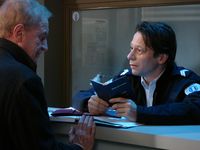MOVIE REVIEW
Wild Grass (2009)

Christophe Jeauffroy/Sony Pictures Classics
The English title is a direct translation of the French word for those little weeds which sprout up in the cracks in sidewalks; in French the phrase is a metaphor for people who are a little bit unconventional. This movie certainly is different, but it works neither as a straight story nor as a genre exercise; and it seems the director wanted it that way.
The legendary Alain Resnais bases "Wild Grass" on a novel by Christian Gailly. It has received high praise — including two special awards at this year's Cannes Film Festival — as a whimsical, fresh delight. There is plenty of whimsy, but none of it fresh or delightful. For example, a character who has hinted at a criminal record and an interest in killing women, uses a pickax for weeding his garden, hardy har har. With one exception, the actors in this film — including Sabine Azéma (Mr. Resnais's award-winning partner, who has great hair), André Dussollier (who narrated "Amélie"), Emmanuelle Devos (heroine of "Read My Lips") and the criminally underused Anne Consigny (the amanuensis in "The Diving Bell and the Butterfly") are left stranded in the sea of a plot that manages to be both threatening and stupid.
Ms. Azéma is Marguerite, whose bag is snatched in a bravura sequence on a shoe-shopping trip; Mr. Dussollier is Georges, who finds her wallet and determines to return it. There is a charming sequence where, while driving home, he practices in his head how he is going to handle calling her. Despite all his best intentions, Georges knows other people's reactions to your desires are totally out of your control. The screen's focus is split between the back of Georges's head as he drives and his face as he runs through different ways of handling the call. But that's the last time the film manages any real feeling.
After their initial phone conversation, Georges get creepier and creepier until the sunny urban setting crawls with menace. Then Marguerite makes a decision that rings completely false both in the context of the film and also in reality. Think of the cliché of women in horror films who go into the empty house. A good film, or good actress, will make you understand why she is compelled to make that choice and not just because it's in the script. As a viewer, you can accept it if it's done well because it makes sense in the context of the film, even if it wouldn't in reality. Not so in "Wild Grass." It's difficult to explain how a character's decision can fail on both of those levels, but here it does. It throws away everything we've learned about Marguerite and doesn't attempt to teach us anything new. The only factor in any decisions from that point forward is the whim of the increasingly ludicrous and misogynistic plot.
The appeal of a film like this for the actors is whether they can meet the challenge of making unbelievable behavior not just believable but understandable, but only Mathieu Amalric, as the policeman who handles the return of the wallet, behaves in a way which suggests that his character has either a grasp on reality or knowledge of appropriate human conduct. What makes his performance truly special is that Mr. Amalric achieves this with little more than body language. It's a little master class in how a great actor is smarter than the script in which he is acting.
The second half of the film is so disjointed and meaningless that perhaps Mr. Resnais has succeeded in making a surrealist film without anyone noticing that's what he was aiming for. When one thinks of his earlier films, or definitive surrealist works such as "Meshes of the Afternoon" or "Un chien andalou," a whole mood sticks in the memory. In these films there is a logic — even if it's that there is no logic — which brought them together into whole, coherent works of arts. In mainstream films, when a motley crew is brought together such as in "The A-Team," there's also at least a cursory explanation of what's going on and why. Perhaps Mr. Resnais's interest with "Wild Grass" was in taking disconnected people and situations and seeing if he could bring them together without the trouble of such explanations. The strength of surrealism is not just in striking images, but in how their juxtaposition creates a clearly defined feeling in the viewer. Of course, Mr. Resnais could have been going for the clearly defined feeling of total confusion.
WILD GRASS
Opens on June 25 in New York and Los Angeles and on June 18 in Britain.
Directed by Alain Resnais; written by Alex Réval and Laurent Herbiet, based on the novel “L’Incident” by Christian Gailly; director of photography, Eric Gautier; edited by Hervé de Luze; music by Mark Snow; production designer, Jacques Saulnier; costumes by Jackie Budin; produced by Jean-Louis Livi; released by Sony Pictures Classics (United States) and New Wave Films (Britain). In French, with English subtitles. Running time: 1 hour 53 minutes. This film is rated PG by M.P.A.A.
WITH: Sabine Azéma (Marguerite Muir), André Dussollier (Georges Palet), Anne Consigny (Suzanne), Emmanuelle Devos (Josépha), Mathieu Amalric (Bernard de Bordeaux), Michel Vuillermoz (Lucien d’Orange) and Edouard Baer (narrator).
Comments